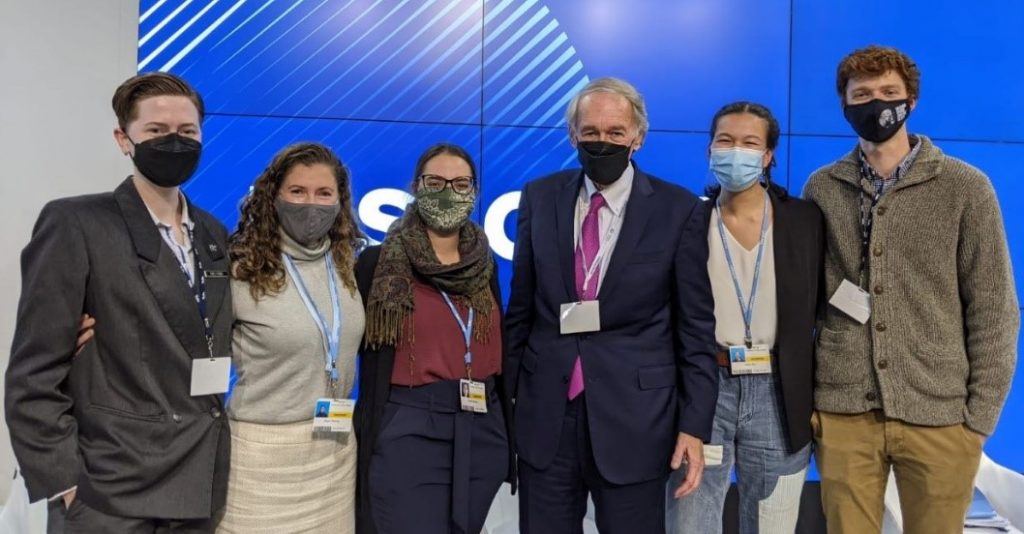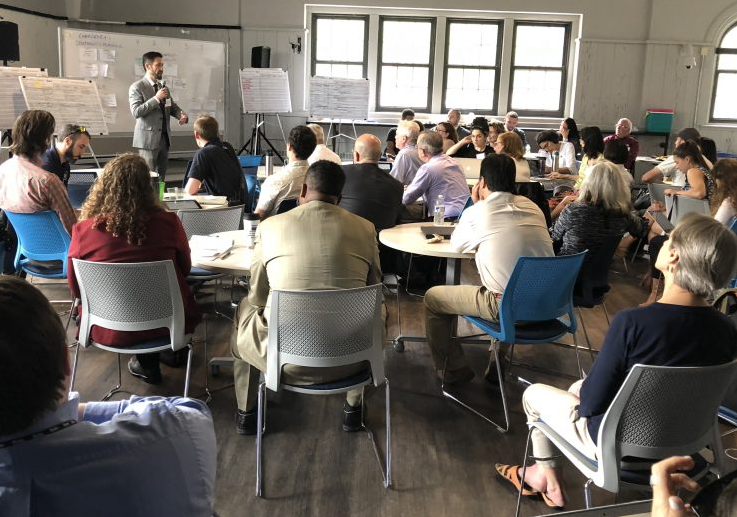Hope, frustration, and urgency have all come out of COP26 along with updated commitments to accelerate climate solutions. But how does a massive convening of world leaders, climate activists, and global key players affect life at Tufts?
While the consequences of climate change span across the world, students, staff, and faculty here at Tufts are researching and implementing projects to reduce waste and emissions, fight for equal access to a clean planet, and work towards national and global climate goals. Below we explain the commitments agreed upon in the Glasgow Climate Pact signed at COP26 and how these are playing out on your campus.
Science and Urgency: Nations at COP26 agreed not only to “fully embed science in the decision-making process” when it comes to climate action, but to act in accordance with the urgency that is needed to achieve the goals laid out by climate science. This includes urgency to reduce global warming as we near the 1.5 degrees Celsius global temperature rise limit.
At Tufts, there is a Sustainability Council made up of faculty, staff, and students that are working to identify climate issues that are most impactful to the Tufts community and set goals to address these issues in alignment with climate science and global climate goals. You can also hear directly from the Tufts delegation of students and faculty that attended COP26 about their observations and attitudes towards climate urgency at the conference.

Climate Adaptation: Nations agreed to “reduce vulnerability, strengthen resilience and increase the capacity of people and the planet to adapt to the impacts of climate change.” Specifically, this includes upholding the climate adaptation goals of the Paris Climate Agreement (signed in 2015) and committing to tracking, communicating, and enhancing global progress on climate adaptation.

In 2018, Tufts conducted a climate resiliency workshop and assessment at the Medford/Somerville campus and in 2020 conducted one at the Boston campus. Here, Tufts community members identified potential climate emergencies that Tuft’s campuses are vulnerable to and created recommendations to address these vulnerabilities.
Climate Mitigation: Nations agreed to accelerate actions that reduce their emissions and limit global temperature rise to 1.5 degrees Celsius. These actions include, but are not limited to, decreasing coal power and other fossil fuels, reevaluating emissions reduction goals, annual reporting on progress towards long-term goals, and an invitation for nations to submit long-term strategies to reach “net zero by mid-century”.
In 2016, President Monaco signed the Second Nature Climate Leadership Commitment, which committed Tufts to reach zero carbon emissions no later than 2050. The Office of Sustainability conducts annual reports on our progress towards this goal and The Tufts University Operations Division recently published an Energy & Water data dashboard showing yearly energy emissions data.
You can take part in this effort to reach zero carbon by 2050 with simple daily climate actions!

Finance, technology transfer and capacity-building for mitigation and adaptation: Overall, the participating nations at COP26 recognized the importance of working collaboratively, raising funds, and sharing knowledge and resources on how best to approach climate mitigation and adaptation. They agreed to continue discussing plans on how to collectively finance mitigation and adaptation strategies through 2027. While action on this issue lags, these funds are critical for Small Island Developing States and Least Developed Countries who tend to experience the most severe consequences of climate change and need adaptation strategies in place to survive.
The Fletcher School’s Climate Policy Lab (CPL) researches climate policies to evaluate their “financial mobilization, economic efficiency, environmental effectiveness, and equity” in order to identify effective ways for governments to fund mitigation and adaptation strategies. The Urban and Environmental Policy and Planning graduate school is also at the forefront of researching and recommending best practices for climate solutions within the “intersection of planning, policy and social justice”.
Sign up for the Office of Sustainability’s webinar in December focused on fossil fuel divestment and the endowment at Tufts to hear more about how finance intersects with the environment.
Loss and Damage: Loss and damage refers to the effects of climate change that are difficult to avoid and includes severe consequences such as “loss of lives, livelihoods and ecosystems”. Nations at COP26 endorsed the need for more money to be provided to help minimize loss and damage and created a plan for discussions on how such funds will be used and given out.
Ways to address loss and damage have been hotly debated in recent years and Rachel Kyte, Dean of the Fletcher School, talks about the difficulties in reaching a consensus about loss and damage solutions in her analysis of the COP26 outcomes.
Implementation: Nations further refined the rules of the Paris Climate Agreement (signed in 2015) and plans to assess the implementation of the goals laid out in the agreement.
In 2017, President Monaco signed on to the We Are Still In joint statement saying that, despite the federal government’s decision to withdraw from the Paris Agreement, the nation remains committed to climate action and meeting its climate goals. Tufts has also signed on to a number of climate commitments aimed at energy, waste, emissions, and much more that are being implemented by an array of departments and student groups across all of our campuses.
Collaboration: Nations committed to including youth, people of all genders, and indigenous communities in climate action. They also recognized the importance of nature in climate solutions and agreed to focus on both land and ocean climate action.
Many Tufts community members are working on researching and integrating diversity, equity, and inclusion into their environmental work (including this UEP graduate thesis on inclusive evacuation during climate emergencies). The Tufts Office of Sustainability recently drafted a plan to address equity and justice within sustainability across all campuses. Read through the plan and leave a comment to help steer the direction of environmental justice on your campus.
Lastly, check out these environmentally focused groups on campus working to amplify the voices of those commonly marginalized in the climate fight and find a way to support climate action at Tufts!

P.S. There are more environmental initiatives happening on all four campuses than are listed above. We encourage you to explore the Office of Sustainability’s website for more info and to talk to your peers about the climate actions they take.

Find Us On Social Media!